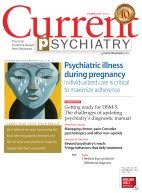Abhilash K. Desai, MD, FAPA, Associate professor, Director Center for Healthy Brain Aging, Department of neurology and psychiatry, Division of geriatric psychiatry, Associate professor, Department of internal medicine, Division of geriatric medicine, St. Louis University School of Medicine, St. Louis, MO
Mehrzad Seraji, MD, Fellow, Department of neurology and psychiatry, Division of geriatric psychiatry, St. Louis University School of Medicine, St. Louis, MO
Maurice Redden, MD, Instructor, Department of neurology and psychiatry, Division of geriatric psychiatry, St. Louis University School of Medicine, St. Louis, MO
Ramasubba Tatini, MD, Private practice, St. Louis, MO
The number of older adults (age ≥65) who developed schizophrenia before age 45 is expected to double in the next 2 decades; the 1-year prevalence of schizophrenia among older adults is approximately 0.6%. This article reviews how positive, negative, and cognitive symptoms and social functioning change over decades and discusses strategies for reducing the impact of long-term antipsychotic use on neurologic and physical health. Although some patients experience schizophrenia onset later in life, in this article we focus on older adults who developed the illness before age 45.
Read full text (free access)
Comment on this article
Email the editor


No comments:
Post a Comment